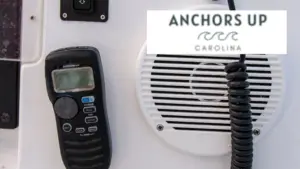The very high-frequency radio, known as a VHF radio for short, is an important piece of safety equipment; however, in addition to safety, it is used in day-to-day operations for hailing marinas and other vessels. However, the radio is often misused. The next time you’re making a call over the marine VHF radio, avoid these 12 mistakes.
Failing To Test The VHF Radio
Before a boat leaves the dock, the operator should inspect equipment directly related to safety, including life jackets, the bilge pump, the horn, the VHF radio, and more.
I departed the dock on a friend’s boat that failed to test the VHF. We came to the realization that the radio was not receiving power over 20 miles offshore.
Without a doubt, the marine radio should be tested before pulling away from the boat ramp or marina. Tune the radio check on channel 9 and clearly request a “radio check” with the microphone button depressed. If you don’t receive a response after several attempts, the radio should be inspected.
Forgetting To Allow Time To Elapse Before Keying The Microphone
Novice boaters tend to make the mistake of keying the mic before the person on the other end finishes speaking.
It is essential to listen and pause. Once a few seconds have passed with no additional communication, you are free to respond without cutting the person on the other end short.
Providing Too Much Information When Speaking
As a former captain, I listened to radio chatter all day long. Undoubtedly, a fair share of boaters are long winded.
For this reason, when you’re speaking over the marine VHF radio, it is critical to get to the point quickly. Remember, fellow boaters are sharing the same channel; don’t hog the ability for everyone to communicate.
Remember, channel 16 is for distress calls. If you’re in need of assistance from the Coast Guard, they will direct you to an alternative channel after making contact. Make the change so others in need can call for help if needed.
Never Identifying The Boat Name
Utilizing your boat name is essential when calling marinas, bridges, and other boats. Each time you make a radio call, remember to state the name of your vessel.
For example, if you’re calling a bridge for an opening, state the bridge name while including the boat name after the bridge.
Stating the name of the boat will help others identify who is making the call. Being spotted is necessary under any circumstances.
Keying The Button To Speak Without Talking
As a captain, I wore a radio on my hip at all times. Often, when driving a vessel while seated, we would key our mics.
Remember to avoid pressing the button when you’re not speaking. A mic that is unknowingly keyed up prevents fellow boaters nearby from utilizing the channel.
Using The Wrong Channel
Often, panicked boaters make distress calls over the wrong channel when faced with an emergency. Fortunately, fellow boaters are willing to help in guiding them on the proper channel.
Additionally, I have heard boaters call bridge tenders on everything but channel 9. Your calls will fall on deaf ears, and you’ll miss scheduled openings until you adjust the frequency and make contact.
Allowing Young Kids To Use The VHF Radio
As an avid angler who monitors fishing channels on the VHF radio, I have heard a lot of chatter from young kids.
Unfortunately, when young children get their hands on the mic, they speak nonsense. It is important to keep the microphone away from the kids. Educate them that it’s not a toy but instead a life saver.
Not Remembering To Say Over After Speaking
Importantly, when making a call on a VHF radio, it is helpful to let the person on the receiving end know when you’re done speaking.
In order to do so, it is wise to say the word “over” after you’re done stating your message. The term “over” will inform the recipient that they are clear to respond without interruption.
Making A Fake Emergency Call
Don’t ever make a fake call over the VHF radio. Fake calls displace rescue crews that are necessary for real emergency situations.
No question about it, a fake call is a felony, and the punishment is severe. You’ll not only be at risk of reimbursing the cost of the response but also hefty fines.
Swearing On The Radio
When you’re speaking over the VHF, it is important to remain mindful of your language. Remember, children are aboard vessels, and they don’t need to hear a foul mouth broadcasted on the marine radio.
I have listened to plenty of swearing over the radio. Often, boaters become angry when no wake zones are ignored, boats don’t give the right of way, or anglers come within close proximity.
Not Taking Into Consideration The Range Of A VHF Radio
Importantly, on a sea level boat, you can only expect to get a range of approximately 5 nautical miles.
With that being said, you can easily become out of range of Coast Guard stations in the event of an emergency. When out of range, it is not uncommon for larger vessels who are within range to relay the distress call to the Coast Guard.
Remember to consider that your calls may fall on deaf ears, depending on the range.
Failing To Adjust The Volume And Squelch
I have made the mistake of making a call on the VHF with the speaker volume turned down. To test the radio volume, dial the squelch all the way up, and you’ll be sure to hear an audible crackle if the volume is up.
Secondly, never leave the squelch in a position where it continues to crackle. Instead, dial it back, the constant sound stops. At this squelch position, voices should be loud and clear.
Keep These 12 Marine VHF Radio Mistakes In Mind
While you’re out on the water operating a vessel, a lot weighs on your mind. However, it is important to use the VHF radio correctly to maximize its effectiveness. Remember, the radio is life saving device. Without question, the biggest benefit is calling for help if you’re in need.






